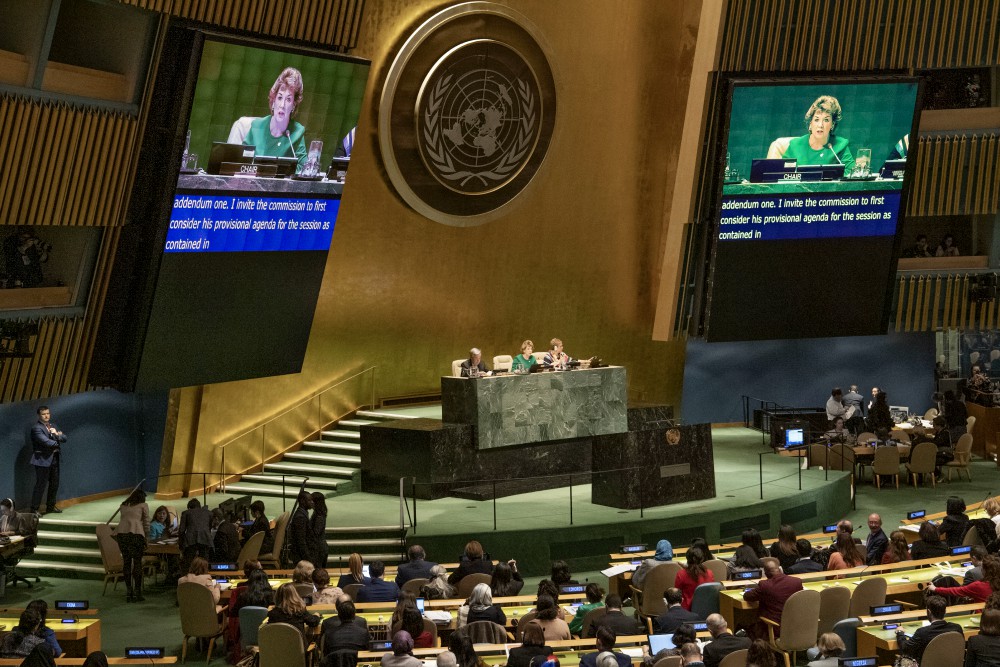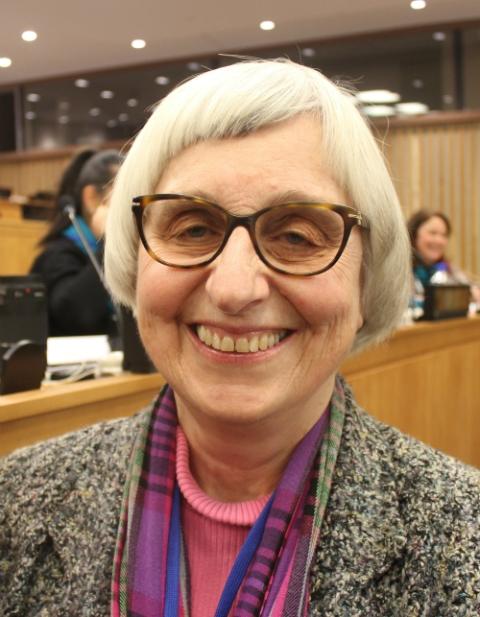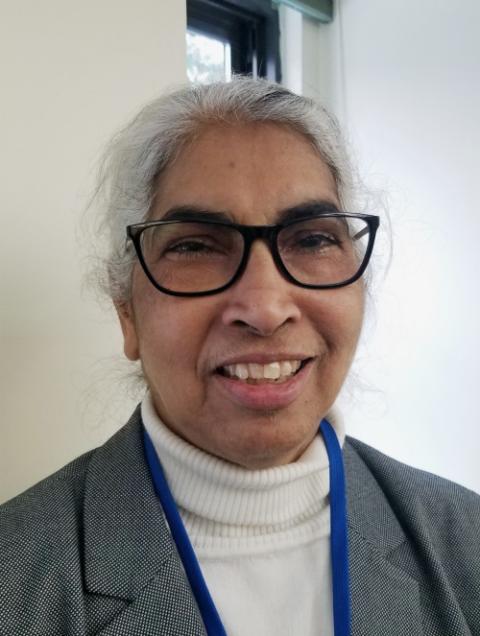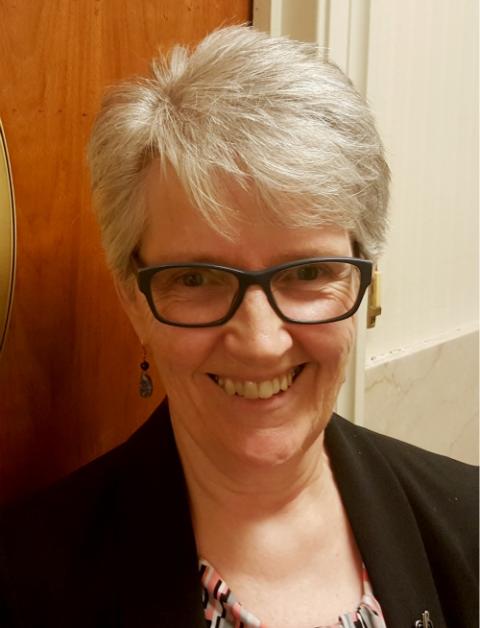
The opening session of the 2019 Commission on the Status of Women at the United Nations headquarters in New York City (U.N. photo)
Catholic sisters say they are disappointed but not surprised that concerns over the new coronavirus prompted the United Nations to cancel the bulk of the 64th session of the United Nations' Commission on the Status of Women, an annual two-week gathering that brings thousands of women from throughout the world to U.N. headquarters in New York City to meet and advocate for women's issues.
In interviews with Global Sisters Report, the sisters said that given the uncertainty about the global spread of the COVID-19 virus, the U.N. probably had no other choice and acted responsibly.

Sr. Carol De Angelo, director of the Office of Peace, Justice and Integrity of Creation for the Sisters of Charity of New York (GSR file photo)
"I'm very disappointed, especially for those who put in so much for the preparations. I know there was great work being done," said Sr. Carol De Angelo, director of the Office of Peace, Justice and Integrity of Creation for the Sisters of Charity of New York. "But it's probably a wise decision with so much unknown."
The move was understandable but is still a setback to the cause of women's rights globally, said Sr. Teresa Kotturan, who represents the Sisters of Charity Federation at the United Nations. The decision puts the issues the commission was going to consider, such as gender equality, discrimination and the rights of women and girls, to the side globally, she said.
"The work has to continue at the local level now," Kotturan said.
Sr. Winifred Doherty, who represents the Congregation of Our Lady of Charity of the Good Shepherd at the U.N., said the cancellation is "a big blow for women this year to come together. It's a big loss."
Nonetheless, Doherty said, "I'm sure that women from throughout the world would say that maintaining health in the global community is of outmost importance."

Sr. Teresa Kotturan, U.N. representative for the Sisters of Charity Federation (GSR file photo)
On the recommendation of U.N. Secretary-General António Guterres, the commission decided March 2 that it will meet today, March 9, for a procedural meeting, hear statements and adopt a draft declaration. It will then suspend the meeting, originally planned for March 9-20, until further notice. No debates are planned and thematic side events and parallel events — which often include a strong presence by Catholic sisters and those associated with religious and grassroots organizations — are canceled.
The session could be rescheduled later this year, U.N. News reported, though Kotturan said that could be difficult given that United Nations events are planned so far in advance.
Kotturan said there are no plans by sisters who represent their congregations at the U.N. to give scaled-down presentations or workshops.
"That would exclude the international community [who had planned to travel to New York], and that would not be good," she said.
Sr. Alice Marie Giordano, coordinator of Justice, Peace, and the Integrity of Creation Office for the Ursuline Sisters' Eastern Province of the United States, said more than 100 female students from the Academy of Mount St. Ursula in the New York City borough of the Bronx had planned to attend events, as did nearly 40 other students from Ursuline schools elsewhere in the United States.
They are keenly disappointed about the cancellation but will give some form of presentation to their fellow students, Giordano said.
The youths will also continue to promote this year's theme for International Women's Day, which was held March 8. Titled "I Am Generation Equality: Realizing Women's Rights," the U.N.-affiliated campaign is "bringing together people of every gender, age, ethnicity, race, religion and country, to drive actions that will create the gender-equal world we all deserve."
The campaign coincides with the 25th anniversary of the U.N.'s 1995 conference of women in Beijing, which produced a landmark "platform for action" on women's rights and equality. It is also an event in which first lady Hillary Clinton famously declared, "Human rights are women's rights and women's rights are human rights," a statement the sisters and others still remember for its inspiration and aspiration.
"We've come a long way in realizing that women are simply asking for basic human rights," Giordano said. But while there is "certainly progress" for gender equality in some areas, she said, women and girls still face many challenges throughout the world, including lack of available education, domestic violence, human trafficking and honor killing, as well as the lack of income equality.
Advertisement
"You see what so many people are up against in making a living," Giordano said.
De Angelo agreed: "We know women are struggling very, very much in the world." In many countries, women cannot own land, and in the United States, many women have to work two to three jobs to stay afloat, she said.
De Angelo noted other challenges: In the rural United States, for example, it is hard for some women to work because of the lack of available child care.
"We need a real family-supportive policy that honors the gifts of women," De Angelo said.

Sr. Winifred Doherty, the U.N. representative of the Congregation of Our Lady of Charity of the Good Shepherd (GSR file photo)
Doherty said the cancellation of the meetings of the Commission on the Status of Women may provide one unintended opportunity.
"I'm sorry it's canceled," she said. "But maybe it's time to take a pause and reflect on what's happening in the world [when it comes to progress for women and girls]."
Like the other sisters, Doherty said she sees some progress since the Beijing conference, but not nearly enough.
"It's been very slow," she said. "There's as much discrimination [against women] as there's ever been, and I think, in general, there's been a real backlash against women's rights."
In Feb. 27 remarks at the New School, a New York City educational institution, Guterres echoed some of the concerns of Doherty and the other sisters.
In his U.N. position, Guterres said he sees "one overwhelming injustice across the globe; an abuse that is crying out for attention. That is gender inequality and discrimination against women and girls."
"Everywhere, women are worse off than men, simply because they are women," he said. "Migrant and refugee women, those with disabilities, and women members of minorities of all kinds face even greater barriers."

U.N. Secretary-General António Guterres speaks Feb. 27 at the New School in New York City. (U.N. photo)
Guterres said such "discrimination harms us all."
"Just as slavery and colonialism were a stain on previous centuries, women's inequality should shame us all in the 21st. Because it is not only unacceptable; it is stupid," he said. "Only through the equal participation of women can we benefit from the intelligence, experience and insights of all of humanity. Women's equal participation is vital to stability, helps prevent conflict, and promotes sustainable, inclusive development.
"Gender equality is the prerequisite for a better world."
Giordano said that despite the many challenges facing women, she remains an "optimist about all that has happened since Beijing."
She has been inspired by the example of philanthropist Melinda Gates using her wealth "to listen to women of Third World countries, recognize the reproductive issues that they faced and then effectively helping [them]." Giordano said she also admires activist Greta Thunberg's "simple strategy that has inspired such change in the climate movement."
"There are so many powerful women becoming recognized and followed," she said.
[Chris Herlinger is GSR international correspondent. His email address is cherlinger@ncronline.org.]








